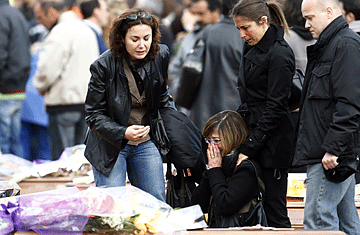
Funeral for those who lost their lives during the earthquake that struck the central Italian town of L'Aquila
Set up in four terribly long rows, the wooden coffins were draped with flowers or soccer jerseys, some left strikingly bare apart from a silver crucifix. But several caskets stood out for another reason: always with the smaller white one perched atop the larger, they held a parent and young child set to be buried together. From Turin in the northwest to Taranto in the southeast, the entire length of Italy's boot-shaped peninsula spent Friday absorbing the broadcast images of the state funeral for the victims of the L'Aquila earthquake: a toy motorcycle placed on top of one such mini-casket; a purple jumper attached to another; surviving relatives collapsing in tears; others bearing the empty gaze of shock.
Italians, so often divided by region and politics and soccer-club loyalty, have come together since the 6.3-magnitude quake shook the central Abruzzo region early Monday morning, leaving 287 dead and some 20,000 homeless. Volunteers and donations have flooded in; so too have prayers from the Pope and countless local priests. Partisan bickering back in Rome has all but ceased. Even the newspapers that scream their Page One headlines with every Silvio Berlusconi faux pas chose to ignore a gaffe the Prime Minister made in the midst of the tragedy, when he told German TV that those forced from their homes should treat the experience like a "camping weekend." (See pictures of Italy after the deadly earthquake.)
There are indeed more pressing matters than Berlusconi's poorly chosen words of encouragement and the editorial choices made by Italian newspapers. By the eve of the funeral, after four days of rallying the nation, it was time for another top Italian political leader to begin asking the harder questions that should go hand in hand with solidarity for the victims.
Giorgio Napolitano, the 83-year-old President of the Republic, arrived in L'Aquila on Thursday and quickly and publicly demanded to know why several modern buildings had been so utterly destroyed by an earthquake that was not a record setter on the Richter scale. "People need to search their consciences," Napolitano said.
Others were already asking the same question. Friday's edition of the La Repubblica daily featured a spot (and certainly preliminary) probe into the collapse of a six-story apartment building in L'Aquila that crumbled to the ground, killing 26 of its 75 residents. A seemingly identical building right next door remained intact, none of its residents even injured. "They planned it in the wrong place," the paper concluded of the devastated building, which was built in the early 1980s.
"There is a lot of sadness today, but also a lot of anger," Piero Faro told a Reuters reporter at the funeral. The Abruzzo native had come to pay his respects to family friend Paola Pugliesi, 65, who died with her son Giuseppe, 45. "Their building simply disintegrated. This should not have happened." A student dorm and a modern hospital also suffered major damage in L'Aquila. Nearby, in the tiny village of Onna, more than 40 people died, while other areas were spared any loss of life.
Seismic tests and architectural retrofitting standards are by now accepted practices in the developed world. Italy, a G-8 country — and host of the next summit of industrialized countries, in July — has been exposed before for lagging behind on antiseismic safety. In 2002 an earthquake that registered just 5.5 on the Richter scale brought down an elementary school in the small southern Molise region, killing a teacher and 27 children. That school collapsed even though it was built after new national standards were imposed following the quake that killed more than 2,500 people in the southern town of Irpinia in November 1980. Five people were recently found guilty of negligence in the Molise school tragedy. (See pictures of the 2002 earthquake in Italy.)
Napolitano's words and the official government inquiry that has been opened should be the focus not just in L'Aquila but throughout the country, which is crisscrossed by two major fault lines and experiences dozens of small earthquakes each year.
Fatalism is considered a national trait in Italy, tracing back to centuries of feudalism and the influence of the Catholic Church. Of course, the faith of ordinary people can be a public good in helping to overcome tragic events that are often beyond human control. But a nation and its leaders must ultimately be judged on the outcome of that portion of destiny which is not preordained.
"There is a chronic incapacity of Italian leaders to think in the long term, or even beyond the next election. To invest in proper seismic standards doesn't get you votes," says Jacopo Zanchini of the Rome-based weekly Internazionale. "We always hear about how Italians are at their best in a crisis, which may be true. But that's also because we're at our worst in trying to avoid the crisis in the first place."
